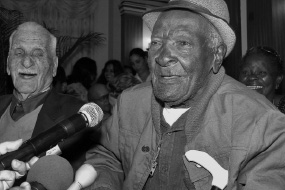Benito Martínez
Benito Martínez Abrogán, possibly the world’s oldest man, died on October 11th 2006, aged around 120
AMONG the attractions that led the conquistadors to hazard their lives on the Atlantic, alongside dreams of mountains of silver and men slicked head to foot in gold, lay the thought of a fountain of perpetual youth. Where this fountain was, no one could say exactly. They would know they had found it when, stumbling on some hidden valley, they would see centenarians tilling the fields and dancing with the energy of young men.
The New World was found; the fountain was not, though Ponce de León, sweating through Florida, surely had premonitions of geriatric aerobics to come. By the 20th century, the mythical source of youth had become politicised and had shifted continents. Stalin placed it in the Caucasus, in Georgia and Azerbaijan: for there men and women lived to extraordinary ages, preserved both by pure air and by communism.

The connection of long life with Marxist dialectic is not proven, but in Cuba it is assumed. There, at the International Conference on Satisfactory Longevity in May 2005, Mercedes Matilde Nuñez, aged 102, sang a popular song; Juana Hernández Fernández, 103, and Professor Eduardo, 104, waltzed round the room to the tune “Almendra”; and Amada Hernández Fernández, 102, announced that she should really be in the kitchen, cooking up a storm of rice, chicken and vegetables with plenty of garlic and coriander.
The star of the show, however, was Benito Martínez Abrogán. He was not there in person, because he preferred to stay 240 miles east in Ciego de Ávila, breeding fighting cocks, growing bananas and tripping the light fantastic with any young nurse he could grab at the senior citizens’ centre. He had turned up there on June 19th 2005 looking impressively dapper, in a woollen jacket and trilby hat and a freshly ironed shirt, to celebrate his 125th birthday.
His precise age was something of a mystery. According to his Cuban identity papers he had been in Cuba since 1925, but his age on arrival was uncertain. He had come from Haiti, and remembered just a little of it: a childhood spent near Cavaellon, a few words of Creole. The Cuban government sent officials to Haiti to check, but they turned up nothing. More officials talked to Mr Martínez’s oldest neighbours; they attested that he had always been the most elderly person they knew. The man himself, beaming his huge toothless smile, declared that his year of birth was 1880. He could not tell the time, relying on the sun’s angle and his own instincts to know when to eat or sleep. But that one date he knew. “I am”, he would say proudly, “the oldest person in the world.”
The regime of Fidel Castro concluded that Mr Martínez was perhaps 119; but that was good enough. Whether or not acknowledged by the “Guinness Book of Records”, it beat Elizabeth Bolden of Tennessee, a mere 116, and thus trumped the United States. In terms of longevity Cubans already matched Americans, living on average for 77 years. The country had so many centenarians, 2,721 out of 11.2m people, that Mr Castro’s own doctor founded a club for them; and this in a country that spent only $251 per head a year on free lifelong health care, against $5,711 for patchy, elitist cover in the United States. Cuba contained, officials said, all the factors for a happy and lively old age: a good genetic mix, a diet without junk food, exercise, motivation and socialist solidarity.
Mr Martínez, their poster-boy, certainly got exercise. He was a labourer all his life, cutting sugar cane (on Mr Castro’s father’s ranch, among others) and helping build the Central Highway. He worked so fast with the guataca, a small hoe, that his friends called him “El Avión”, the aeroplane. Like most Cubans, he had no car; hebiked or walked barefoot, or waited for a fume-spilling bus with that patience and stoicism that calms down stress. Since food was rationed, he did not eat much except what he could grow.
Apart from all that, his life was not exemplary. He smoked until the age of 108 or so, cigarettes being handed out cheap among his rations. He never married, but chased many women. His “fresh” diet was mostly starchy cassava and sweet potatoes cooked in pork fat. Asked the secret of his youthfulness, he said he had never cheated a man or said bad things of other people. And he had a good socialist motivation to survive: he wished, someday, to shake Fidel Castro’s hand.
Cuba’s cradle-to-grave health care had in fact done little for him. He did not consult a doctor until he was around 115, and never went to hospital until the last few days of his life. Had he needed care earlier it would have been astonishingly good for a developing country, but standards are lower now than in the past. Money has been siphoned elsewhere, to “health tourism”; ordinary patients must bring their own lightbulbs and bedsheets. Cuba’s best levels of health care, like its centenarians, are put on display mostly to show the world what it can do.
And what of that other elderly man, bearded and now frail, recovering slowly from “intestinal bleeding”, but still the longest-serving ruler in the world? Why, says his optimistic doctor, he may still survive to 125; for he is lucky enough to live in Cuba, the site of the Fountain of Youth.